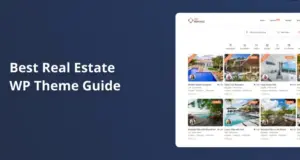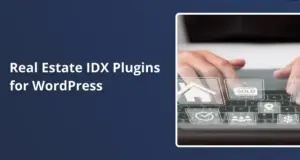Let’s face it. These days, you need to stand out from the competition and generate real estate leads. Social media for real estate agents is a MUST if you want to make it big. A solid online presence will differentiate you from the competition, increase your visibility, and allow you to connect with potential clients. To help you create the best social media strategy for your real estate business, I’ve broken down the key strategies and tactics for each of the most popular social media platforms and how to use them.
Why Use Facebook for Real Estate?
With more than 2.8 billion active users, Facebook is an obvious choice for social media real estate marketing. It offers robust advertising capabilities, including precise targeting, retargeting, and a wide range of ad formats. Facebook is one of the best platforms for generating leads, especially for newer agents looking to establish a client base. Plus, the organic reach of your Facebook page will be quite low compared to when it first launched. This means you should pay to play. This is where Facebook Ads come in.
How to Use Facebook for Real Estate
- Focus on lead generation
- Post updates on your listings
- Share personal branding content
- Use Facebook Ads
- Utilize high-quality images and engaging text in ads
- Monitor ad performance regularly
- Adjust targeting as needed
- Engage directly with followers
Tips and Best Practices for Facebook Social Media Marketing
When creating Facebook posts, focus on generating high-quality leads by sharing property photos, virtual tours, neighborhood highlights, and testimonials. Use Facebook Ads targeting the right audience to amplify your reach. Take advantage of Facebook Groups related to real estate to build a network of potential clients. Facebook Messenger is a great tool for staying in touch with leads and clients. Remember to engage with your audience through comments, messages, and by joining conversations in relevant groups.
if you’re still not convinced about Facebook, here’s an article that may change your mind: 19 Best Real Estate Facebook Posts (+ Examples & Ideas)
Why Use Instagram for Real Estate?
Instagram is a platform for sharing stunning images and videos, making it perfect for showcasing properties and your real estate brand. The platform is popular among millennials and Gen Z, making it an excellent choice for reaching future homebuyers. Instagram also offers powerful advertising options and features like Stories, Reels, and IGTV that allow for creative, engaging content. Using Instagram for real estate is about connecting with potential clients on a personal level.
How to Use Instagram for Real Estate
- Post updates on your listings
- Focus on personal branding rather than just properties
- Use hashtags to reach a broader audience
- Engage directly with followers
- Share daily updates and behind-the-scenes moments
- Use Instagram Stories
Tips and Best Practices for Instagram
To build your brand, post consistently on your feed and engage with your followers through comments and direct messages. Use Stories to share daily updates, behind-the-scenes moments, and client testimonials. Utilize relevant hashtags and geotags to expand your reach. Remember, consistency and authenticity are key on Instagram. Share a mix of professional content and personal insights to build a strong, relatable brand.
Real-World Example
The real estate agent in this Instagram profile makes a point of posting photos that highlight her life beyond work. She posts family photos, meal photos, and more. It’s about creating a well-rounded image that resonates with potential clients on a personal level.
YouTube
Why Use YouTube for Real Estate?
As the second largest search engine in the world, YouTube is an excellent platform for creating long-form content that educates and engages your audience. By answering common questions about buying and selling in your area, you can position yourself as a local expert. Additionally, optimizing your videos for search with local keywords and engaging titles can drive organic traffic to your channel. This makes YouTube one of the most important social media platforms for real estate agents.
How to Use YouTube for Real Estate
- Create informative content, like market updates and property walkthroughs
- Post content regularly to keep your audience engaged
- Collaborate with other local YouTubers or businesses to expand your reach
- Include a clear call-to-action (CTA) in every video, directing viewers to your website or listings
- Optimize video titles, descriptions, and tags for search
Tips and Best Practices for YouTube
Start with one video per week and focus on local SEO by optimizing titles, tags, and descriptions. Share videos that answer common questions about buying and selling in your area. Use analytics to track which videos perform best and adapt your strategy accordingly. Engage with your audience through comments and encourage them to subscribe and share your content.
Real-World Example
Here’s a great example of an informative YouTube video: 5 Things I Wish I Knew Before I Bought a House. It answers common questions for homebuyers and positions the agent as a knowledgeable, trustworthy source of information.
Why Use LinkedIn for Real Estate?
LinkedIn is a professional networking platform, making it an ideal choice for connecting with other industry professionals and potential clients. By sharing your achievements, market insights, and engaging with other professionals in the industry, you can establish yourself as a thought leader in real estate. You can also use LinkedIn for real estate lead generation by connecting with other professionals and potential clients in your area.
How to Use LinkedIn for Real Estate
- Post professional updates and market insights
- Engage with other industry professionals
- Share articles, industry news, and your thoughts on trends
- Use LinkedIn Groups to connect with potential clients
- Post 2-3 times a week
- Tailor content for a business audience
Tips and Best Practices for LinkedIn
Share professional updates, market insights, and industry news to stay top-of-mind with your professional network. Engage with other professionals in the industry by commenting on and sharing their content. Join LinkedIn Groups related to your local area or industry to connect with potential clients. Use LinkedIn as a platform to showcase your expertise and build relationships with potential clients and referral partners.
How to Dominate Social Media in 2025
Platforms to Use
In 2024, it’s all about being where your clients are. Each platform offers unique advantages, so choose the ones that align with your goals and target audience. Facebook is great for lead generation and offers detailed targeting options. Instagram is perfect for building a personal brand and showcasing properties visually. YouTube is a powerhouse for long-form content that educates and engages. LinkedIn is ideal for professional networking and B2B connections. TikTok is emerging as a game-changer, offering a youthful audience and creative engagement opportunities. Don’t be afraid to try out new platforms like Threads or Clubhouse to see how they fit into your strategy.
Content Strategies
Content is king in the social media landscape. Your content should be informative, engaging, and tailored to each platform. Mix it up with a variety of content types—photos, videos, carousels, and text posts. Use high-quality images and engaging captions on Instagram, create educational videos for YouTube, and share quick updates and client testimonials on TikTok. Don’t forget the power of storytelling—share your journey, client success stories, and the behind-the-scenes moments that make your business unique.
Analytics and Advertising
Analytics are your best friend when it comes to social media. Use platform insights to track engagement, reach, and conversion rates. This data will help you understand what works and what doesn’t, allowing you to refine your strategy over time. Paid advertising can amplify your reach, especially on platforms like Facebook and Instagram. Start with a small budget, test different ad types, and use targeting options to get the most bang for your buck.
Tips for Your Real Estate Social Media Strategy
- Be consistent in your posting schedule and branding
- Engage with your audience regularly—respond to comments and messages
- Use relevant hashtags to increase your reach
- Collaborate with other local businesses or influencers
- Stay authentic—let your personality shine through
- Continuously learn and adapt your strategy based on what works best
Conclusion
Social media for real estate is not just an option—it’s a necessity. A well-rounded real estate social media marketing strategy will be your secret weapon to success in 2025. Remember, it’s not just about being present on social media; it’s about making a strategic impact. So, roll up your sleeves, get creative, and watch your business thrive!
Here at WpResidence, we get it. It can be quite overwhelming at first. To simplify it, I’ll share the top 5 real estate social media tips I wish someone had told me:
It’s OK to not be everywhere all the time – Pick a few platforms that fit your style and target audience.
Consistency is key – Whether it’s posting once a week or once a day, stick to your plan.
Quality over quantity – Don’t post just for the sake of it. Share content that adds value.
Engage, don’t just broadcast – Respond to comments, ask questions, and start conversations.
Don’t be afraid to experiment – Try different types of content, like videos, polls, or even memes. What works best will surprise you!
With the right strategy, you can effectively use social media to boost your business, connect with potential clients, and establish yourself as an industry expert. By focusing on the platforms where your target audience spends the most time, you can maximize your impact and grow your business.
We hope you enjoyed this guide to real estate social media marketing strategies. Remember, social media is a powerful tool that, if used correctly, can help you reach your goals faster. Do you have any tips or platform suggestions that you think would be helpful? Let us know in the comments!








